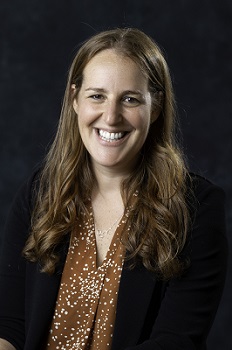Rowan historian awarded NEH summer stipend for research on antisemitism in Cold War Latin America
Rowan historian awarded NEH summer stipend for research on antisemitism in Cold War Latin America
During the late Cold War, repressive authoritarian regimes in the Southern Cone of Latin America targeted anyone they perceived as subversive — which often broadly meant those on the ideological left.
Many Jews engaged in social justice causes or political groups that brought them under suspicion of these regimes.
Military regimes in Argentina, Chile and Uruguay committed widespread human rights violations to those they arrested, such as political imprisonment, torture and disappearances. However, imprisoned Jews often were treated particularly harshly in jails. Further, antisemitic literature was widely published, despite the regime’s strict censorship.
 Debbie Sharnak (at right), assistant professor of history in Rowan University’s College of Humanities & Social Sciences, is researching Jews’ experiences during the dictatorship and the Jewish networks across North America that responded to their plight. She hopes to reveal the complex political calculus actors confronted, such as how Jewish rights fit in with emerging human rights imperatives, Cold War calculations, Israeli politics and more.
Debbie Sharnak (at right), assistant professor of history in Rowan University’s College of Humanities & Social Sciences, is researching Jews’ experiences during the dictatorship and the Jewish networks across North America that responded to their plight. She hopes to reveal the complex political calculus actors confronted, such as how Jewish rights fit in with emerging human rights imperatives, Cold War calculations, Israeli politics and more.
Sharnak received a $6,000 summer stipend from the National Endowment for the Humanities (NEH) that will jumpstart her research. This summer, she is developing the core foundational research to launch the new project, Jewish Internationalism and the Southern Cone Dictatorships, searching archives in Washington, D.C., and New York City.
In addition to the NEH stipend, Sharnak won three other awards this year: the Marshall T. Meyer Research Travel Grant from the Human Rights Archive at Duke University ($1,000), the Duke Jewish Studies Library Research Fellowship ($2,000), and the Rabbi Joachim Prinz Memorial Fellowship from the American Jewish Archives in Cincinnati ($3,000).
This work builds on her first book, Of Light and Struggle: Social Justice, Human Rights and Accountability in Uruguay, published this month by the University of Pennsylvania Press. In more than 30 archives across Latin America, the United States and Europe, she analyzed how discussions of human rights shifted before, during and after the dictatorship and how they impacted claims and movements for justice of the dictatorships’ crimes.
“One of the ideological goals of the dictatorships was to root out any perceived subversives and communist elements, as they defined them, within the country,” she said. “Jews, who largely came from Eastern Europe, many of them with Russian backgrounds or Eastern European-sounding last names, were automatically perceived as being sympathetic to the Soviet Union and often came under intense scrutiny by the regimes.
“Because there were elements of antisemitism that ran through the military, Jews who were imprisoned received much harsher punishments of torture.” She also focused on Afro-Uruguayans and LGBTQ populations and how the regime targeted different underrepresented groups in unique ways.
While searching through the Foreign Ministry archives in Uruguay, Sharnak found letters from the Anti-Defamation League’s Rabbi Morton Rosenthal in the United States, who advocated for Jews in Uruguay. That discovery launched her current project, a geographically broader effort.
“I wanted to take a look at the response of Jewish activism primarily in the United States to antisemitism, not only in Uruguay, but also across Latin America and the other Southern Cone dictatorships that were occurring around the same time.”
In March, she will conduct research at the American Jewish Archives in Cincinnati. She also will perform research at Duke University in Durham, North Carolina. In the future, she will travel to Chile, Argentina and back to Uruguay.
“Jewish groups in the United States weren’t heterogeneous in their reaction to the dictatorship; they had very different perspectives,” Sharnak said.
She will examine those responses, as well as the groups’ relationships with Jewish groups in Chile, Argentina and Uruguay.
Sharnak hopes to increase awareness of how antisemitism impacted this population.
“There’s a notion that if these dictatorships were not the Nazis, it was not bad … but just because that antisemitism doesn’t look like those European abuses doesn’t mean that it didn’t occur,” she said. “It’s expanding our idea and understanding of antisemitism as well as the international reaction and activism in response to that antisemitism. It’s a fundamentally under told story because there aren’t as many Jews in Latin America.”
Sharnak is eager to begin the summer project. “This stipend is a gamechanger for getting this project off the ground,” she said.
She hopes to present some initial findings at conferences in the upcoming year. Eventually, she plans to publish several articles and a book based on this research.
“Without having the ability to focus solely on this for two full months this summer, the scope of this research probably wouldn’t have happened for potentially two to three years,” she said. “I feel very fortunate.”